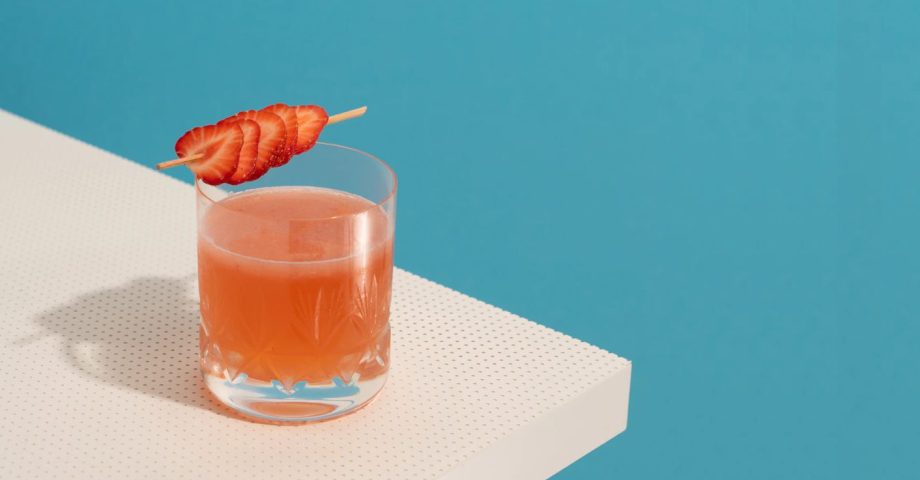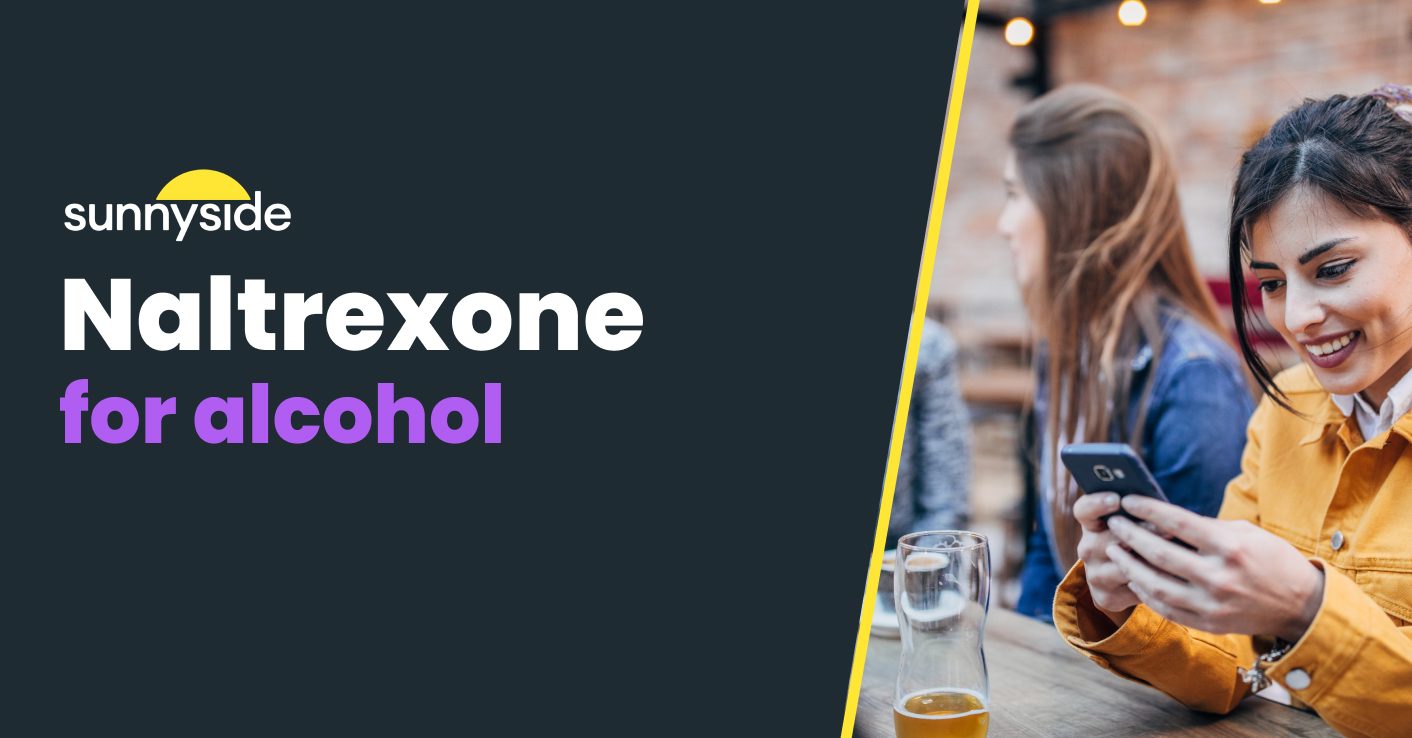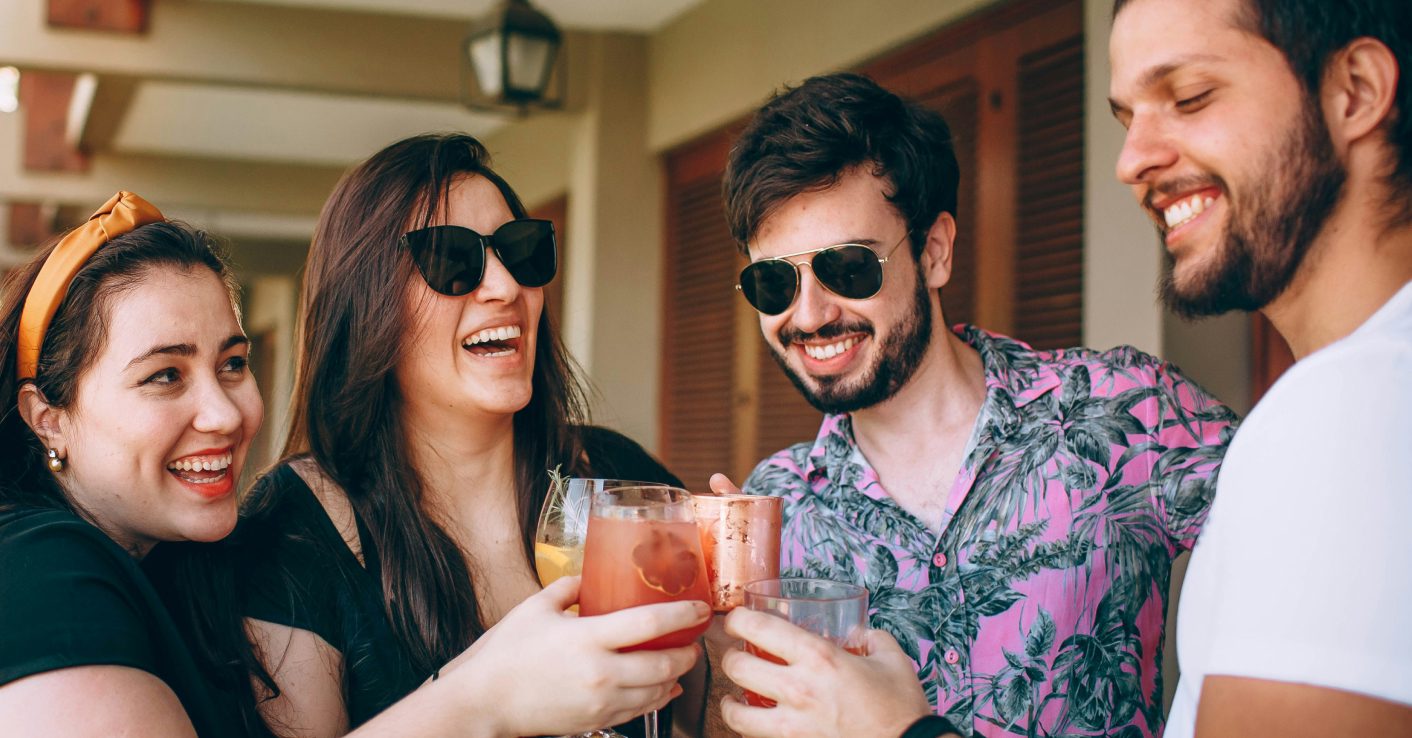Last Updated on May 17, 2023
I was recently chatting with our friends at Ritual Zero Proof about their values, mission, and take on challenges like Sober October and Dry January. It wasn’t a big surprise to find that we both share the same perspective that mindful drinking is all about getting more out of life, not taking away something we enjoy. The conversation sparked the idea for this post, a chance for us to share a bit of our own philosophies and encourage a balanced, mindful approach to cutting back on drinking. (Check out Ritual Zero Proof for a true alcohol-free liquor replacement. We love them!).
Because Sunnyside was created during the pandemic and we are truly a global, remote company, we haven’t had the chance to socialize in person after a long day at work. But based on the fun we have in our virtual happy hours, it’s fairly easy to assume that almost everyone here enjoys drinking alcohol to some degree. This is an important distinction about who we are at Sunnyside. We enjoy alcohol occasionally, but even more importantly, we enjoy balance, clear mornings, and exploring non-alcoholic alternatives for the evening wind-down.
As we’ve built Sunnyside we’ve heard many stories about how alcohol has had a negative impact on people’s lives in some way, usually due to a family member or close friend having a tough time. We believe that alcohol is something that absolutely should be taken seriously and managed proactively, just like we manage our mental health, our diet and exercise, and various other parts of our lives.
Nick and I (the Sunnyside co-founders) initially designed Sunnyside for ourselves, and quickly found that it resonated with everyone we talked to (Try it for yourself here with our 15-day free trial). It’s a system that helps our members understand how alcohol impacts them, and provides insights and tools to make gradual progress to reach their goals through proven psychology-backed techniques. Whether someone wants to cut back on their drinking or simply improve their habits, Sunnyside has something to offer for almost anyone who drinks.
In general, we don’t believe in an all-or-nothing approach regarding alcohol health. In fact, it can create a dichotomy in the conversation that makes it virtually impossible to talk about cutting back on drinking without any judgement. For us, Sober October and other months like Dry January provide opportunities to celebrate the mindful drinking movement. While many people will choose to take some time off of drinking in October, we’re here to encourage alternative approaches that will help people stick with their goals and the healthy habits they learn.
What is Sober October?
According to Healthline, Sober October is a trend that started in “2014 as a fundraising campaign for Macmillan Cancer Support, a U.K.-based charity that provides support to people living with cancer. This campaign’s primary goal is raising money, but the movement also emphasizes the importance of checking in with yourself about your relationship with alcohol. Over the last few years, Sober October has become a more general movement around the world.”
According to the Macmillan website, to officially participate you sign up for a 31-, 21-, or 14-day sobriety challenge, ask friends or family to donate, and ultimately help people who are living with cancer.
We absolutely support Sober October and all the benefits that can come with it (both from a fundraising and personal health perspective), but we do think Sober October might have a branding problem.
The potential downsides of Sober October
“Sober October” is inherently presented as an all-or-nothing approach simply from the name. The framing could potentially turn people off. But we think the biggest risk to 30-day sober challenges is that they can set you up for failure in two key ways: First, you simply may not be ready to take 30 days off, so you decide to call it quits a week in and you suddenly feel like a failure. Recovering from that feeling of “failing” can be difficult and emotionally draining. In reality, you likely did accomplish something important by taking a week off of drinking, but it can be hard to celebrate if you didn’t complete the entire month as planned.
The second problem is that you may actually over-correct when you start drinking again after the 30-day challenge. This is fairly common with any sort of crash diet. When we completely stop ourselves from having something (whether it be alcohol or food), we naturally crave that thing more and more.
“When you are dieting, you actually become more likely to notice food. Basically your brain becomes overly responsive to food, but you don’t just notice it—it actually begins to look more appetizing and tempting. It has an increased reward value. So the thing you’re trying to resist becomes harder to resist. So already, if you think about it, it’s not fair.” ~ Traci Mann, Psychology Professor at the University of Minnesota
The potential downsides of Sober October aren’t around the health benefits per se, but more about how a short 30-day challenge isn’t really enough time to examine alcohol in the context of your overall health. This is where mindful drinking comes in and plays a key piece in our approach and why we believe Sunnyside is making a meaningful difference in people’s lives.
What is Mindful Drinking?
Mindful drinking is more than an idea. It’s a movement. A community growing larger by the day. Put simply, it’s all about thinking while drinking. Mindful drinking is not about quitting alcohol but instead being aware of how much alcohol you’re drinking and its impact on you in the moment. It’s about recognizing the reasons for and the ramifications of drinking. It’s about improving your relationship with alcohol so you maximize enjoyment and minimize negative side effects like hangovers, regrets, and anxiety.
Benefits of mindful drinking
Summarized from our Mindful Drinking 101 guide, our medical advisor Dr. Hrishi Belani sat down with us to outline the benefits of practicing mindful drinking:
- Improved sleep. Alcohol in high amounts can disrupt sleep patterns causing you to awake tired and unrested. Cutting back from high to moderate or low amounts of alcohol has been shown to improve sleep quality substantially.
- Anxiety reduction. A decrease of 30% in drinking in 30 days (which is being achieved by Sunnyside members) can lead to better sleep and reduced anxiety. Excessive alcohol consumption causes hormonal imbalances which can increase anxiety in stressful situations.
- Weight management. Overdoing it on alcohol consumption is a common barrier to maintaining a healthy weight. At an average of 125 calories per drink, even a small reduction can make a big difference.
- Lower blood pressure. Alcohol use in heavy amounts—greater than 3 to 4 drinks a day—is associated with higher blood pressure. Cutting back by 2 to 3 drinks per day can help lower both systolic and diastolic pressure.
- Better liver function. Many physicians have seen an uptick in patients with alcoholic hepatitis and alcoholic liver disease. Alcohol use can lead to a build-up of fat in the liver. This accumulation of fat can be a precursor to liver damage. A modest reduction in alcohol use can help prevent these potentially dangerous changes.
- Healthier skin. There are some aesthetic benefits of mindful drinking too. Heavy drinking is not a recipe for glowing skin. Heavy alcohol use can lead to more wrinkling and early aging of the skin. It is also pro-inflammatory, and can cause disruption of the usual function of blood vessels in the skin. This can result in skin that looks duller, drier and puffier, and may even cause facial redness and blotchiness.
- More brainpower. The liver isn’t the only important organ that will benefit from more mindful drinking. One of the most common benefits that patients talk about when cutting back on their drinking is the greater focus, clarity and mental energy they enjoy. The result is often higher cognitive performance and greater motivation.
Mindful drinking with non-alcoholic beverages
One of our absolute favorite things about our Sunnyside journey has been finding and tasting new non-alcoholic beverages that seem to be popping up every day. It’s an industry that’s exploding. In fact, it’s expected to hit $1.44T in size by 2025. What that means for the mindful drinking consumer is that there are more options than ever to stock your fridge with tasty, often mood-enhancing beverages.
It’s become normal for many people (including many of us at Sunnyside) to have beer, non-alcoholic beer, kava, or CBD drinks in our houses at the same time. What this does is provide an alternative to winding down at the end of the day while keeping alcohol to a minimum. And for those trying to tackle Sober October, it means there are other appealing drinks readily available to order.
Our friends at Ritual Zero Proof create an amazing line of true liquor replacements. Their Tequila, Whiskey, Rum, and Gin alternatives are extremely well reviewed and are perfect non-alcoholic spirits to have on hand for any bar, but especially if your goal is to start drinking more mindfully.
They’ve given us access to 19 of their mocktail recipes that you can experiment with:

Fun alternative challenges for Sober October (or any month!)
Sunnyside is successful for tens of thousands of members in large part because it creates personal accountability and puts them in the driver’s seat. On a weekly basis, Sunnyside members receive a recommended set of drink targets for the week that match their goals, whether cutting back or simply maintaining current levels. They always have the option of modifying their plan at any time.
What this does is create a commitment based on what was planned at the beginning of the week. In many ways, these weekly commitments are little challenges to be as mindful, proactive, and intentional as possible. We’re not telling our members to not drink, we’re simply asking them to consider their drinks if they do decide to partake.
While the challenge to go sober for all of October is certainly a good one, we also know that alternative challenges during the month can help create just as much awareness and health benefits, and these are the challenges our members are doing every month anyway.
Here are some quick ones that our team put together for you to consider if Sober October isn’t quite your cup of tea.
- Try Alternative Drinks – A fun, simple, and tasty challenge is to try stocking your fridge with alternative drinks. This will provide you with several options for the evening wind-down, or for socializing with friends. Sticking entirely to non-alcoholic beverages for the evening is great, but you can also use them to rotate with regular drinks. Our friends at Better Rhodes have an incredible marketplace of non-alcoholic options if you need a place to start.
- Track Every Drink – While tracking every drink you have might feel excessive at first, it’s a habit that’s easy to build and discreet. By tracking each drink as you have it, you create a moment of conscious interference to check in with yourself and make sure you really want/need that next drink. Many of our members report that just the act of tracking their drinks makes them more aware and slow down just enough to feel more mindful.
- Dry Weekends – For many of us (myself included) the weekends are a chance to unwind and sometimes have one-too-many drinks. Why not challenge yourself to not drink on weekends for a month. It won’t feel too restrictive since you can still unwind after work on the weekdays with a glass of wine, but for the weekends you’ll be prioritizing healthy mornings and restful nights.
- Dry Weeknights – The cousin to the Dry Weekends challenge, this is pretty self-explanatory. For many of us the daily ritual of having a drink after work is deeply engrained. Challenge yourself to not have any drinks on weekdays for a month. You’ll find many other ways to unwind, such as a short workout, meditation, or just hopping on a call with a friend to connect.
- Space Out Your Drinks – Another simple challenge that will help build great long-term habits, adding an intentional amount of time between each drink will help you slow things down, have a glass of water between each drink, and consider if you really want/need the next one.
Tips for a more mindful Sober October (or whatever challenge you choose!)
- Have a plan and stick to it. Mindful drinking (and Sober October) is a proactive practice. Have a plan in mind when entering a social situation and stay the course. When cutting back, chances are you’ll be offered a drink that you’ll want to decline. Sincerely thank the person, say no thanks, and redirect the conversation. You can be kind and still decline. Prioritize you and your goals.
- Order drinks with half shots. This tip is more for the mindful drinkers out there. Out on the town? Ask your bartender to make your drink with half the amount of alcohol. It’s like ordering a half-regular, half-diet Coke. With mindful drinking on the rise, chances are you’re not the first person to make this request. Half shots are an easy way to reduce your alcohol intake while also allowing yourself to sip on cocktails twice as long.
- Alternate with water. This win-win solution helps with hydration and pacing. Turn it into a consistent, positive habit for yourself by always drinking a big glass of water between your drinks. And don’t forget to end your day with a couple extra glasses just to top things off.
- Surround yourself with positivity. Often those you care about will support you in goal setting and achievement. If you’re cutting back or trying Sober October, reach out to the friend who will want to join you for a morning walk or yoga session versus a boozy brunch. Physical activities such as hiking, biking, skiing or shooting hoops are easy ways to socialize without a drink in hand. And when at parties or out to eat or cheering on your favorite team, sit next to those who simply don’t care what’s in your cup.
- Socialize mindfully. One of the best parts of mindful drinking is how it often leads to mindful engagement. When you look at socializing not so much as a reason to drink but more as a way to meaningfully connect with others, chances are you’ll leave social situations feeling far more fulfilled. Use cutting back as an opportunity to truly engage.
- Remember “new” is only new for a little while. Just like starting an exercise program or diet, cutting back on drinking can feel different because it’s new. But unlike many exercise programs and diets, mindful drinking is often just a series of small tweaks that have minimal day-to-day impact but provide maximum long-term results. Focus on all the positives this “new” normal will bring and remember that “new” will be “normal” soon enough.
- Have a backup plan. Sometimes a few rounds of beers will turn into a few rounds of shots, which wasn’t part of your plan. This is when you need to be particularly mindful of social pressure. If the evening changes course or you realize the people you’re with have different drinking plans, allow yourself the freedom (and power) to call it a night. This may mean leaving earlier than anticipated, with your nightcap being a cocktail of comfortable clothes, your couch and Netflix.
- Reward yourself. Give yourself something to look forward to if you stick to your plan. Maybe it’s a fancy coffee drink or a new book or a long bike ride on a new trail you’ve been wanting to try. This doesn’t need to be a forever thing but it’s a great in-the-beginning motivator.
- Enjoy the clarity. If you’re used to increasingly blurry evenings with fuzzy endings, pay attention to how you feel on the mornings you wake up after cutting back – no hangover, no headache, no dry mouth, no light and sound sensitivity, no fatigue. Instead you’re energized and you remember all the interesting little details of a fun night with family or friends. Capture this feeling and remember it. This is why you’re cutting back. Savor these successes.
Do Sober October Your Way
There’s no doubt that taking some time off of drinking can be really good for you, and we fully support the movements. I’ve been known to take extended breaks from drinking myself if I’m trying to focus on work or a new fitness routine. It can be empowering and help reset sleep and diet.
In the long-term, if you do drink, mindful drinking offers benefits that live on in perpetuity. Plus the habits that you start to build with mindful drinking can add value to other areas of your life. You still enjoy the occasional drink, but you’re prioritizing getting more out of your mornings, evenings and weekends. Mindful drinking is all about getting more out of your life, not taking something away that you enjoy.
Choose what feels right for you and make sure to arm yourself with some fun non-alcoholic drink alternatives. They never let us down!
We don’t get any incentive or payment from the partners in this post. We’re genuinely trying to connect our members and readers with the best brands in the mindful drinking space. ❤️



